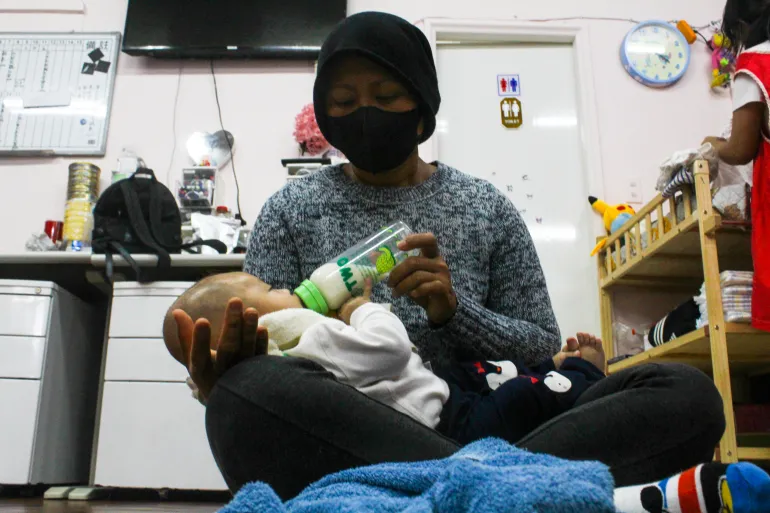In Taiwan, a growing number of Southeast Asian migrant workers are escaping oppressive work conditions and turning to undocumented labour to survive. Many came to the country legally, hoping for better futures, but found themselves mistreated by brokers and employers, forcing them into a life of hiding. These undocumented migrants now live on the edge of society, fearing deportation and lacking access to basic services like healthcare, housing, and labour rights.
One such worker is Bernard, a 45-year-old Filipino who entered Taiwan legally in 2016 to work in an electronics factory. But by 2024, he became undocumented after clashing with his broker. Bernard said the broker tried to take his passport and pressured him to resign without severance. After resisting these demands, Bernard found himself blacklisted from legal jobs, forcing him to work odd construction gigs while constantly hiding from authorities. “It’s like I’m a bird in a cage,” he said, speaking in whispers and gestures to avoid detection.
Taiwan’s broker system, introduced in 1992 to manage foreign labour, has become a source of deep abuse and exploitation, according to migrant rights advocates. Brokers control almost every aspect of a worker’s life—from job placements to housing and even access to healthcare. Workers are charged monthly fees, as well as extra costs for documentation, hospital visits, job transfers, and vacation. Many complaints received by Taiwan’s Ministry of Labour each year are directly linked to brokers, showing the scale of dissatisfaction and mistreatment in the system.
By early 2025, Taiwan had recorded over 90,000 undocumented migrant workers, double the number from four years earlier. The majority are from Vietnam, Indonesia, and the Philippines, with Vietnamese workers making up more than 57,000. While Taiwan is often seen as one of Asia’s few liberal democracies, its treatment of migrant workers paints a different picture—one of neglect and lack of protection.
Catholic priest Joy Tajonera, who runs a migrant shelter in Taichung, blames the government’s passive role in enabling abuse. He says that migrants often flee not because they want to break the law, but because they are desperate and feel trapped. “The system allows brokers too much power,” he said. Though undocumented migrants might earn more without paying broker fees, they lose all access to social protection, making their situation even more fragile.
Taiwan’s Ministry of Labour has responded to criticism by raising the minimum wage and increasing inspections. However, it has also increased fines for visa overstayers from $330 to over $1,600. Critics like Lennon Ying-Da Wang, director of Serve the People Association, argue that these penalties only push migrants deeper into hiding. He says the government should focus on improving protections—especially in industries like fisheries and domestic care, where minimum wage laws often don’t apply and exploitation is most common.
In Taipei, Harmony Home, a non-governmental organization, provides care for undocumented migrant mothers and their children. Founder Nicole Yang said the number of children arriving at the shelter is rising fast. In 2024 alone, the shelter supported over 110 new children, and by April 2025, that number had already reached 140. Still, the shelter receives no official funding, and the government is not obligated to cover care or medical costs, even in humanitarian cases.
In Lishan, a remote farming area in Taichung City, undocumented workers pick fruit and vegetables during the harvest season. Many of them escaped from fishing boats or caregiving jobs due to low pay and mistreatment. These mountain farms provide some safety from city police, but exploitation continues. Workers often face threats from employers, and wages are sometimes withheld. “If I complain, they’ll report me. Who will help me?” said Mary, a 46-year-old Filipina working illegally on cabbage farms after fleeing a caregiving job.
Experts like Li-Chuan Liuhuang from National Chung Cheng University argue that reforming Taiwan’s labour system won’t be easy. She believes the broker system needs tighter regulation and more transparency, including clear rules on recruitment fees and better protections for all workers. But public resistance remains high, and many Taiwanese still see undocumented migrants as a threat rather than essential labourers who keep the agricultural and caregiving sectors running.
Despite the growing risks, thousands of undocumented migrants like Bernard and Mary continue to work silently across Taiwan. They live in fear but remain determined to send money back home, support their families, and hold on to hope—even if only from the periphery of Taiwanese society.

